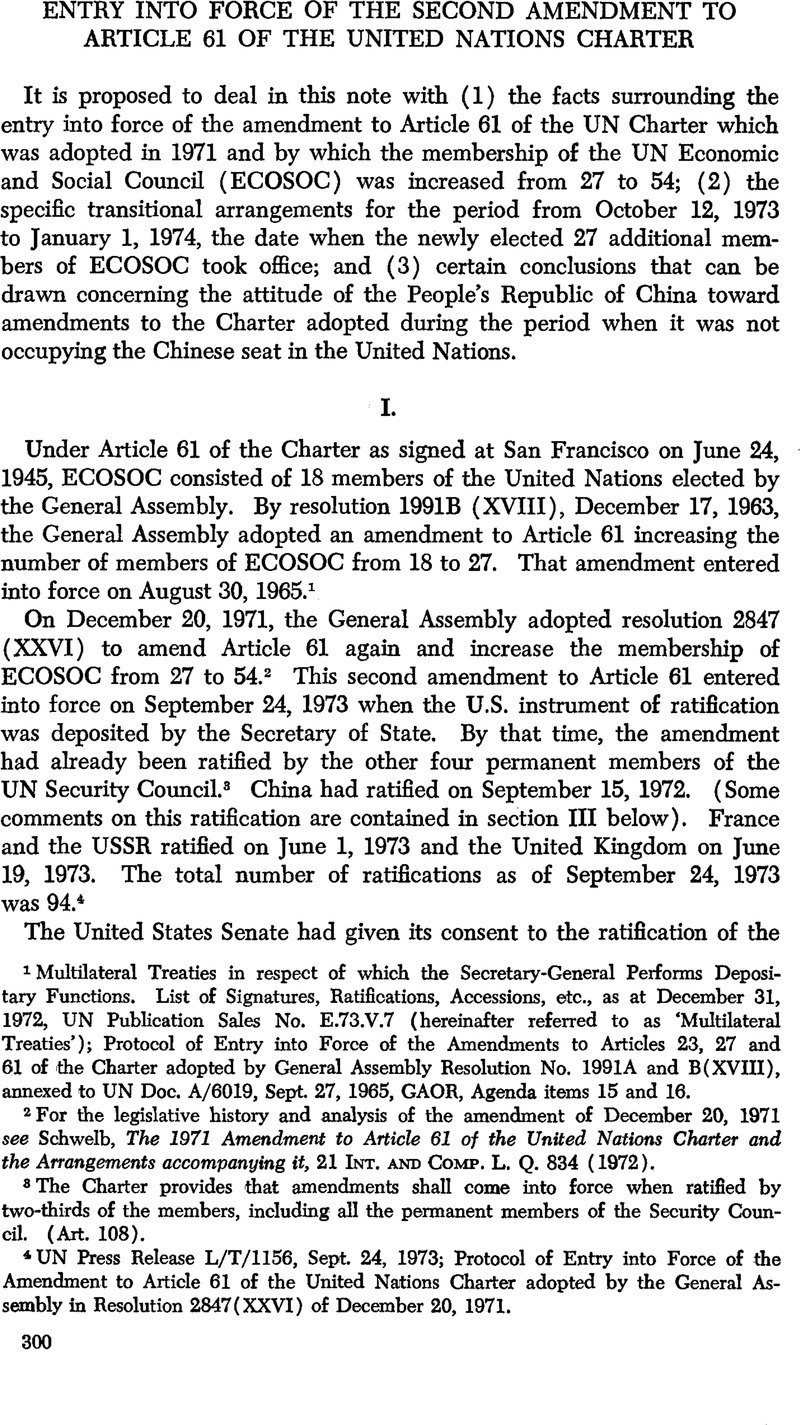Article contents
Entry into Force of the Second Amendment to Article 61 of the United Nations Charter
Published online by Cambridge University Press: 28 March 2017
Abstract

- Type
- Notes and Comments
- Information
- Copyright
- Copyright © American Society of International Law 1974
References
1 Multilateral Treaties in respect of which the Secretary-General Performs Depositary Functions. List of Signatures, Ratifications, Accessions, etc., as at December 31, 1972, UN Publication Sales No. E.73.V.7 (hereinafter referred to as ‘Multilateral Treaties’); Protocol of Entry into Force of the Amendments to Articles 23, 27 and 61 of the Charter adopted by General Assembly Resolution No. 1991A and B( XVIII), annexed to UN Doc. A/6019, Sept. 27, 1965, GAOR, Agenda items 15 and 16.
2 For the legislative history and analysis of the amendment of December 20, 1971
see Schwelb, , The 1971 Amendment to Article 61 of the United Nations Charter and the Arrangements accompanying it, 21 Int. and Comp. L. Q. 834 (1972)CrossRefGoogle Scholar.
3 The Charter provides that amendments shall come into force when ratified by two-thirds of the members, including all the permanent members of the Security Council. (Art. 108).
4 UN Press Release L/T/1156, Sept. 24, 1973; Protocol of Entry into Force of the Amendment to Article 61 of the United Nations Charter adopted by the General Assembly in Resolution 2847(XXVI) of December 20, 1971.
5 119 Cong. Rec. S15804–05 (daily ed. Aug. 3, 1973); S1594–55 (daily ed. Sept. 5, 1973).
6 Resolution 1828(S-II), adopted by ECOSOC at its 1880th plenary meeting, Sept. 17, 1973.
7 The relevant events of 1965 are described in detail in Schwelb, , Amendments to Articles 23, 27 and 61 of the Charter of the United Nations, 59 AJIL 850 (1965)CrossRefGoogle Scholar and in an addendum thereto in 60 AJIL 374 (1966).
8 Reports of the Economic and Social Council on the work of its 52nd and 53rd (1972) sess., GAOR, 27th sess., SUPP. NO. 3 (A/8703) Annex II and on the work of its 54th and 55th (1973) sess., GAOR 28th sess., SUPP. No. 3 (A/9003), Annex II.
9 UN Doc. A/PV.2152 (Provisional), Oct. 12, 1973.
10 UN Doc. E/SR.1881 (Provisional), Oct. 15, 1973.
11 U N Doc. A/PV.2177 (Provisional), Nov. 23, 1973.
12 “Multilateral Treaties” (supra note 1), at iii.
13 Ibid.
14 “Multilateral Treaties” supra note 1, at 25. See also, The Soviet Union reverses its position, 59 AJIL 842 (1965).
15 In the matter of the amendments to the Constitution of the World Health Organization of 1946, increasing the number of members of its Executive Board, the People’s Republic of China proceeded differently. It took positive action concerning their acceptance. Originally, the Executive Board of WHO had 18 members. By amendments to Articles 24 and 25 of the Constitution, adopted in 1959, the number was increased to 24; by amendments adopted in 1967 the number was further increased to 30. The amendments of 1967 enlarging the WHO Executive Board to 30 members were accepted on behalf of the Republic of China on January 19, 1971. The change in the representation of China took place on October 25, 1971. On January 14, 1974 the People’s Republic of China deposited its instrument of acceptance of the 1967 amendments to the Constitution. “Multilateral Treaties” supra note 1, at 195; UN Press Release L/T/1233, Jan. 18, 1974.
16 “Multilateral Treaties” supra note 1, at 28. See also Schwelb, supra note 6 and idem. Entry into Force of the Amendment to Article 109 of the Charter of the United Nations, 18 Int. and Comp. L. Q. 1009 (1969).
- 1
- Cited by


